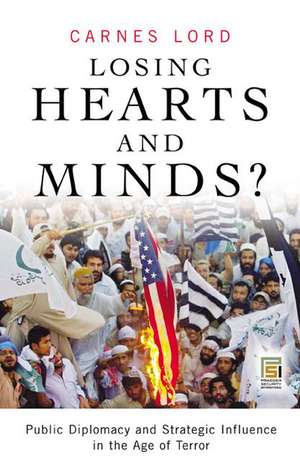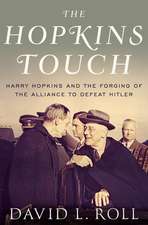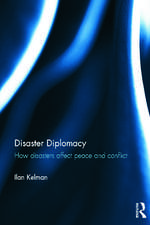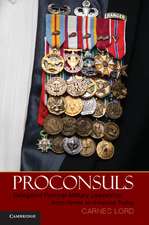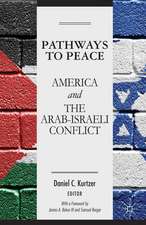Losing Hearts and Minds?: Public Diplomacy and Strategic Influence in the Age of Terror: Praeger Security International
Autor Carnes Lorden Limba Engleză Hardback – 29 aug 2006 – vârsta până la 17 ani
Din seria Praeger Security International
- 18%
 Preț: 334.19 lei
Preț: 334.19 lei - 8%
 Preț: 335.53 lei
Preț: 335.53 lei - 34%
 Preț: 376.10 lei
Preț: 376.10 lei - 46%
 Preț: 443.64 lei
Preț: 443.64 lei - 29%
 Preț: 240.11 lei
Preț: 240.11 lei - 8%
 Preț: 304.56 lei
Preț: 304.56 lei - 34%
 Preț: 373.82 lei
Preț: 373.82 lei - 19%
 Preț: 412.79 lei
Preț: 412.79 lei - 19%
 Preț: 338.42 lei
Preț: 338.42 lei - 18%
 Preț: 335.62 lei
Preț: 335.62 lei - 27%
 Preț: 377.35 lei
Preț: 377.35 lei - 27%
 Preț: 376.75 lei
Preț: 376.75 lei - 18%
 Preț: 336.46 lei
Preț: 336.46 lei - 18%
 Preț: 321.73 lei
Preț: 321.73 lei - 27%
 Preț: 384.51 lei
Preț: 384.51 lei - 18%
 Preț: 320.50 lei
Preț: 320.50 lei - 18%
 Preț: 320.50 lei
Preț: 320.50 lei - 18%
 Preț: 321.35 lei
Preț: 321.35 lei - 24%
 Preț: 420.54 lei
Preț: 420.54 lei - 14%
 Preț: 335.99 lei
Preț: 335.99 lei - 18%
 Preț: 355.82 lei
Preț: 355.82 lei - 18%
 Preț: 319.83 lei
Preț: 319.83 lei - 18%
 Preț: 334.28 lei
Preț: 334.28 lei - 32%
 Preț: 354.48 lei
Preț: 354.48 lei - 14%
 Preț: 335.14 lei
Preț: 335.14 lei - 38%
 Preț: 405.98 lei
Preț: 405.98 lei - 40%
 Preț: 571.34 lei
Preț: 571.34 lei - 18%
 Preț: 321.85 lei
Preț: 321.85 lei - 18%
 Preț: 323.25 lei
Preț: 323.25 lei - 18%
 Preț: 253.28 lei
Preț: 253.28 lei - 40%
 Preț: 571.50 lei
Preț: 571.50 lei - 14%
 Preț: 333.72 lei
Preț: 333.72 lei - 18%
 Preț: 301.73 lei
Preț: 301.73 lei - 19%
 Preț: 352.96 lei
Preț: 352.96 lei - 26%
 Preț: 387.80 lei
Preț: 387.80 lei - 18%
 Preț: 302.77 lei
Preț: 302.77 lei - 14%
 Preț: 333.91 lei
Preț: 333.91 lei - 17%
 Preț: 325.80 lei
Preț: 325.80 lei - 34%
 Preț: 414.73 lei
Preț: 414.73 lei - 18%
 Preț: 354.30 lei
Preț: 354.30 lei - 29%
 Preț: 254.29 lei
Preț: 254.29 lei - 18%
 Preț: 354.11 lei
Preț: 354.11 lei - 18%
 Preț: 334.38 lei
Preț: 334.38 lei - 14%
 Preț: 302.68 lei
Preț: 302.68 lei - 18%
 Preț: 322.97 lei
Preț: 322.97 lei - 27%
 Preț: 376.50 lei
Preț: 376.50 lei - 27%
 Preț: 322.81 lei
Preț: 322.81 lei - 27%
 Preț: 382.91 lei
Preț: 382.91 lei - 18%
 Preț: 320.87 lei
Preț: 320.87 lei
Preț: 338.58 lei
Preț vechi: 445.98 lei
-24% Nou
Puncte Express: 508
Preț estimativ în valută:
64.79€ • 70.36$ • 54.43£
64.79€ • 70.36$ • 54.43£
Carte tipărită la comandă
Livrare economică 22 aprilie-06 mai
Preluare comenzi: 021 569.72.76
Specificații
ISBN-13: 9780275990824
ISBN-10: 0275990826
Pagini: 152
Dimensiuni: 152 x 229 x 18 mm
Greutate: 0.39 kg
Editura: Bloomsbury Publishing
Colecția Praeger
Seria Praeger Security International
Locul publicării:New York, United States
ISBN-10: 0275990826
Pagini: 152
Dimensiuni: 152 x 229 x 18 mm
Greutate: 0.39 kg
Editura: Bloomsbury Publishing
Colecția Praeger
Seria Praeger Security International
Locul publicării:New York, United States
Notă biografică
Carnes Lord is Professor of Military and Naval Strategy in the Strategic Research Department at the Naval War College in Newport, RI. Dr. Lord is a distinguished scholar, educator, and former government official who served as the National Security Advisor to the Vice President and the Director of International Information and Communications Policy on the National Security Council Staff at the White House. His most recent book, The Modern Prince: What Leaders Need to Know Now, was acclaimed by The Wall Street Journal as an instant classic.
Cuprins
ContentsContentsForeword by John Hughes viiPreface ixChapter 1. Introduction 1Chapter 2. Strategic Influence and Soft Power 15Chapter 3. Public Diplomacy and Psychological-political Warfare 27Chapter 4. Strategic Influence in the Age of Terror 37Chapter 5. Problems of Legitimacy: The Cultural Context 57Chapter 6. Problems of Organization: The Bureaucratic Context 65Chapter 7. The State Department: Back to the Future? 73Chapter 8. International Broadcasting: Who's In Charge? 83Chapter 9. The Defense Department: Into the Act? 93Chapter 10. The White House: Key to the Game? 103Chapter 11. Strategic Influence and the Future 111Notes 117Index 135
Recenzii
Lord, a professor of military and naval strategy at the US Naval War College, assesses the definition and role of American public diplomacy, or the overseas communications activities of government. The focus is on the governmental infighting that has recently marked the American use of public diplomacy, with the author suggesting ways to restructure the bureaucracy to increase the effectiveness of public diplomacy in the war on terrorism. He specifically champions a revived United States Information Agency (USIA) and vigorous ideological engagement on various issues, including the Israeli-Palestinian dispute; democracy and market economics; media policy; education reform; and state building. Public diplomacy, the author claims, should always serve the national interests of the US..[t]he work adds to the growing body of literature on public diplomacy by presenting some of the structural and practical elements that impede effective communication. Recommended. Upper-division undergraduates through practitioners.
Drawing on his high-level public policy experience, he outlines what he considers to be an appropriate strategy to develop the organizational mechanisms within the U.S. government needed to carry out an effective public-diplomacy campaign to defeat the center of gravity of Islamic terrorism, which lies not in its organizational structure but in its ideological inspiration the real source of the fresh recruits who continue to flock to the terrorist banner..Mr. Lord's discussion of the role of public diplomacy and strategic influence as vital instruments of American national power is especially pertinent today as the administration and Congress goes about the business of confronting religious extremism and terrorism.
Weighs in on the vital debate over public diplomacy, offering both analysis of and prescriptions for some of the most complex issues facing U.S. foreign policy today. Lord believes that public diplomacy is a matter of strategic importance and that bureaucratic disarray, intellectual confusion, and political squeamishness are preventing the United States from performing this task successfully.. Makes a strong case that a broad review of public diplomacy is urgently needed, and his holistic approach and unblinking focus on the relationship of public diplomacy to U.S. grand strategy will greatly benefit such a review. Much of what Lord says will be controversial, but a healthy dose of controversy may help stimulate the wide-ranging debate this important subject urgently needs.
Carnes Lord's Losing Hearts and Minds is one of 2006's more salient and disturbing books..Lord, a professor of strategy at the Naval War College, understands that the War on Terror is an ideological struggle, pitting democracy against tyranny and terror. Carnes argues that the United States and the West have not successfully engaged the ideas inspiring Islamist-led terrorism. It is indeed a tough subject--the Baker-Hamilton Iraq Study Group barely touched on the terror war's ideological dimensions. Carnes notes how the media and Hollywood frequently compromise American soft power (moral, political and information persuasion). His suggestions for improving the selling of democracy include a revived and revamped U.S. Information Agency.
Drawing on his high-level public policy experience, he outlines what he considers to be an appropriate strategy to develop the organizational mechanisms within the U.S. government needed to carry out an effective public-diplomacy campaign to defeat the center of gravity of Islamic terrorism, which lies not in its organizational structure but in its ideological inspiration the real source of the fresh recruits who continue to flock to the terrorist banner..Mr. Lord's discussion of the role of public diplomacy and strategic influence as vital instruments of American national power is especially pertinent today as the administration and Congress goes about the business of confronting religious extremism and terrorism.
Weighs in on the vital debate over public diplomacy, offering both analysis of and prescriptions for some of the most complex issues facing U.S. foreign policy today. Lord believes that public diplomacy is a matter of strategic importance and that bureaucratic disarray, intellectual confusion, and political squeamishness are preventing the United States from performing this task successfully.. Makes a strong case that a broad review of public diplomacy is urgently needed, and his holistic approach and unblinking focus on the relationship of public diplomacy to U.S. grand strategy will greatly benefit such a review. Much of what Lord says will be controversial, but a healthy dose of controversy may help stimulate the wide-ranging debate this important subject urgently needs.
Carnes Lord's Losing Hearts and Minds is one of 2006's more salient and disturbing books..Lord, a professor of strategy at the Naval War College, understands that the War on Terror is an ideological struggle, pitting democracy against tyranny and terror. Carnes argues that the United States and the West have not successfully engaged the ideas inspiring Islamist-led terrorism. It is indeed a tough subject--the Baker-Hamilton Iraq Study Group barely touched on the terror war's ideological dimensions. Carnes notes how the media and Hollywood frequently compromise American soft power (moral, political and information persuasion). His suggestions for improving the selling of democracy include a revived and revamped U.S. Information Agency.
